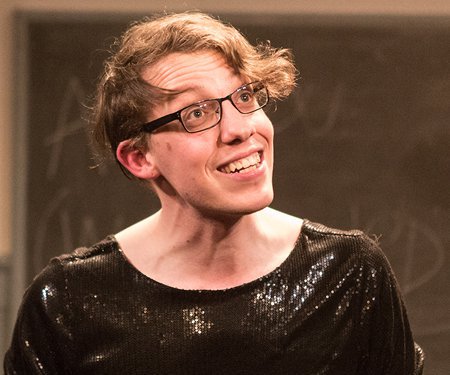Guy Somerset • 18 February 2018
The Writers & Readers–bound Scottish performer, poet and “general doer of things” tells Guy Somerset about name-making, spoken word and the appeal of a Chill Out Corner away from the crowd.

Harry Giles is presented by LitCrawl Wellington with the support of the International Literature Showcase and Writers' Centre. Harry's 2018 Writers & Readers sessions include Opening Night: Women Changing the World, 7–8.30pm, Thu 8 March at Michael Fowler Centre; Fun and Games with Harry Giles, 1.15–2.15pm, Sat 10 March at the Festival Club; and Harry Giles Poetry, 11.30am–12.30pm, Sun 11 March, Circa 2.
French philosopher Blaise Pascal reckoned “all of humanity’s problems stem from man’s inability to sit quietly in a room alone”. Your extensive creative output, including some of the best games ever, suggests just such an inability, but with us the beneficiaries rather than the sufferers.
Well, I actually spend a huge amount of time quietly in a room alone, it’s just that I’m also often on the internet. I do love sending messages out into the world, sending a lot of different bottles into the sea, but that’s driven as much by anxiety and economics as it is by desire. If it weren’t so difficult to make money from art, would I still make so many different things? If I didn’t find socialising so hard, would I still find human connection by constantly starting new projects? Career art is a lottery, and there’s no way to beat that game except by buying a lot of tickets, which is very expensive if you’re doing it alone. The older I get, the more I find myself wanting to sit quietly at home and spend a long time making just one thing – it requires a different sort of engagement, a different sort of depth. But then I’m also suspicious of the tyrannical idea of the Great Work: there’s something beautiful about choosing to spend your artistic time making lots of small slings and arrows rather than spending your life building one nuclear warhead. You didn’t have a question and I don’t have any answers, except that I never saw something pretty that I didn’t want to try and make a version of myself, and I prefer making a lot of art to going to a lot of parties.
-“The older I get, the more I find myself wanting to sit quietly at home and spend a long time making just one thing – it requires a different sort of engagement, a different sort of depth”
Tell us about growing up – trans and autistic – in Orkney. Did your imagination run wild even then? Were you devising games? What were your creative outlets? When did you come to realise the endless potential of art?
Every child I’ve ever met makes up games and stories and performances; it takes an education to beat it out of them. I think, in my case, I wasn’t very good at people so I found my solace in continuing to make up games and stories and performances rather than doing anything else, and I was awkward enough not to let anyone stop me. And art was always safety when people were cruel. But really what I remember most about my childhood is being outside a lot: an island of 18 square miles where you can walk and play anywhere actually has a lot more space and opportunity than a city of a million people.
In my experience and belief, small rural communities are both a great deal more accepting and a great deal more exclusive than big urban centres. It’s the complex double-bind of real community: you have to just rub along because there’s no escape, but when you can’t rub along there’s no escape. There are more obvious oddballs more obviously integrated into normal community life on an island than in a city, but when you transgress it is harder to run away somewhere that’ll accept you. In a city, the weirdoes can build their own community spaces and forms of flourishing, but they struggle more to be met by the normals. On an island, nobody’s normal, but if you get too abnormal then it can really hurt.
Earlier this year you wrote a great thread on your Twitter page about spoken word poetry and how “hegemonic culture identifies certain forms as subaltern and aesthetically degraded, and how marginalised people retake and mess with those forms”. Do say more.
Oh dear, that sounds like a very over-complicated way of putting things, and it’s actually quite simple, I think. People with power and money like to think they’re better than everyone else, and that the things they like are better things than all the other things. So opera gets more money and status than hip hop. If you’re from a community that makes an artform like hip hop and you want to build a life, you’ve got a few choices. You can take all the awful things that are said about your artform and then push those aspects really hard, making a celebration of what others think is a shame. Or you can make a big joke out of those things to show how ridiculous the ruling ideology is. Or you can force your way into the cultures with all the power and money, proving that your culture is as good as theirs. Most people do all of these things at once in different ways.
So with “spoken word”, what you’ve got there is an artform that came out of marginalised culture: its aesthetics are rooted in both the Black Arts Movement and queer liberation culture in the US, and those aesthetics have been adopted and adapted by different cultures around the world (as well as co-opted and appropriated by powerful people who just want to look cool). Spoken word artists are celebrating things about their artform that are often looked down on (like a focus on complex rhythmic patterns or personal storytelling), and they’re also being ironic about those techniques, and they’re also stealing aesthetics from the dominant culture (like putting your poetry in books) and forcing their way into that kind of legitimacy. But most of the time the conversation about this divide is really ignorant of the history, of where the aesthetics come from and why, which is really boring and frustrating for those of us who care about it.
-“So with ‘spoken word’, what you’ve got there is an artform that came out of marginalised culture: its aesthetics are rooted in both the Black Arts Movement and queer liberation culture in the US”
I love the sound of your Chill Out Corner project. How has that taken off? I for one would welcome holing up in such a corner.
It’s been run a good few times, sometimes with me there, and sometimes with other people running it! I’m very happy for other people to take the idea and run with it: I’m just building on other people’s work myself, after all. I’d like to see it becoming as standard in cultural spaces as, for example, a crèche area is (which should also be way more standard). There are many ways that people are excluded from the arts, and the dominance of crowded, noisy spaces is just one of them.
What makes me most happy, when it’s run, is the messages I get from people who aren’t autistic but who really appreciate the different ways of thinking and being and relaxing that an autism-centred space can offer. When you integrate accessibility into art, everyone benefits, because everyone has their sense of normality and their sense of themselves gently undermined.
-“When you integrate accessibility into art, everyone benefits, because everyone has their sense of normality and their sense of themselves gently undermined”
What games are you bringing with you – or devising – for your New Zealand audiences?
I’m expecting to mostly focus on walking games, because walking around is how I get to know a new place. I love walking around a new city or walking up a new hill: it’s a very peaceful and creative time for me. And I’ll also be playing a lot of language games, as always; listening to the differences in languages and thinking about what they mean.
You can join Harry Giles for some of his games at 2018 Writers & Readers – a sure-fire afternoon of confounding delight with Wellington writer and performer Jo Randerson, on Saturday 10 March.
Guy Somerset was the founding editor of ARTicle Magazine. He is a former Books & Culture Editor of NZ Listener and Books Editor of The Dominion Post.


